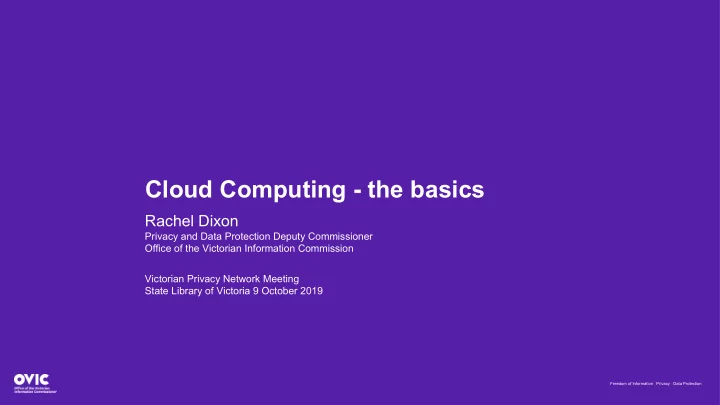

Cloud Computing - the basics Rachel Dixon Privacy and Data Protection Deputy Commissioner Office of the Victorian Information Commission Victorian Privacy Network Meeting State Library of Victoria 9 October 2019 Freedom of Information | Privacy | Data Protection
What is “cloud computing,” anyway?
Freedom of Information | Privacy | Data Protection
Freedom of Information | Privacy | Data Protection
Freedom of Information | Privacy | Data Protection
Freedom of Information | Privacy | Data Protection
Freedom of Information | Privacy | Data Protection
The virtual machine To vastly over-simplify, a virtual machine is software emulating a physical machine Using a virtual machine, a single server can run multiple virtual machines, allocating the memory, processor and disk of the physical machine to multiple different VMs Each VM seems, to the end-user, to be the same as a single physical machine Freedom of Information | Privacy | Data Protection
Freedom of Information | Privacy | Data Protection
Most computer servers these days run Virtual Machines Freedom of Information | Privacy | Data Protection
Freedom of Information | Privacy | Data Protection
Freedom of Information | Privacy | Data Protection
Freedom of Information | Privacy | Data Protection
Freedom of Information | Privacy | Data Protection
Freedom of Information | Privacy | Data Protection
Freedom of Information | Privacy | Data Protection
Freedom of Information | Privacy | Data Protection
Freedom of Information | Privacy | Data Protection
Cloud is only cheaper if you design for it Freedom of Information | Privacy | Data Protection
For some applications that need to scale up or down, it’s much cheaper. But if you take an existing application and put it in the cloud it may cost much more to run Freedom of Information | Privacy | Data Protection
Freedom of Information | Privacy | Data Protection
Freedom of Information | Privacy | Data Protection
Cloud computing and the IPPs
Principle 4—Data Security 4.1. An organisation must take reasonable steps to protect the personal information it holds from misuse and loss and from unauthorised access, modification or disclosure. 4.2. An organisation must take reasonable steps to destroy or permanently de-identify personal information if it is no longer needed for any purpose. Privacy and Data Protection Act 2014 Freedom of Information | Privacy | Data Protection
Principle 9—Transborder Data Flows 9.1. An organisation may transfer personal information about an individual to someone (other than the organisation or the individual) who is outside Victoria only if— (a) the organisation reasonably believes that the recipient of the information is subject to a law, binding scheme or contract which effectively upholds principles for fair handling of the information that are substantially similar to the Information Privacy Principles; or (b) the individual consents to the transfer; or (c) the transfer is necessary for the performance of a contract between the individual and the organisation, or for the implementation of precontractual measures taken in response to the individual’s request; or (d) the transfer is necessary for the conclusion or performance of a contract concluded in the interest of the individual between the organisation and a third party; or (e) all of the following apply— (i) the transfer is for the benefit of the individual; (ii) it is impracticable to obtain the consent of the individual to that transfer; (iii) if it were practicable to obtain that consent, the individual would be likely to give it; or (f) the organisation has taken reasonable steps to ensure that the information which it has transferred will not be held, used or disclosed by the recipient of the information inconsistently with the Information Privacy Principles. Privacy and Data Protection Act 2014 Freedom of Information | Privacy | Data Protection
Cloud Vulnerabilities • Legal/control risk • Unsecured services (especially storage) • Poorly designed software • Poor development practices • Poor user management • Vendor lock-in potential Freedom of Information | Privacy | Data Protection
Recommend
More recommend